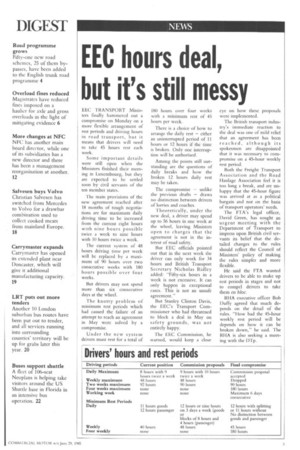EEC hours deal, but it's still messy
Page 5

If you've noticed an error in this article please click here to report it so we can fix it.
EEC TRANSPORT Ministers finally hammered out a compromise on Monday on a more flexible arrangement of rest periods and driving hours in road transport, but it means that drivers will need to take 45 hours rest each week.
Some important details were still open when the Ministers finished their meeting in Luxembourg, but they are expected to he settled soon by civil servants of the ten member states.
The main provisions of the new agreement reached after 18 months of tough negotiations are for maximum daily driving time to be increased from the current eight hours with nine hours possible twice a week to nine hours with 10 hours twice a week.
The current system of 48 hours driving time per week will be replaced by a maximum of 90 hours over two consecutive weeks with 180 hours possible over four weeks.
But drivers may not spend more than six consecutive days at the wheel.
The knotty problem of minimum rest periods which had caused the failure of an attempt to reach an agreement in May were solved by a compromise.
Under the new system drivers must rest for a total of 180 hours over four weeks with a minimum rest of 45 hours per week.
There is a choice of how to arrange the daily rest — either an uninterrupted period of 11 hours or 12 hours if the time is broken. Only one interruption will be authorised.
Among the points still outstanding are the questions of daily breaks and how the broken 12 hours daily rest may be taken.
The compromise unlike the previous drafts — draws no distinction between drivers of lorries and coaches.
Theoretically, under the new deal, a driver may spend up to 56 hours in one week at the wheel, leaving Ministers open to charges that the agreement is not in the interest of road safety.
But EEC officials pointed out that in the next week the driver can only work for 34 hours and British Transport Secretary Nicholas Ridley added: "Fifty-six hours in a week is not excessive. It can only happen in exceptional cases. This is not an unsafe agreement."
But Stanley Clinton Davis, the EEC's Transport Commissioner who had threatened to block a deal in May on safety grounds, was not entirely happy.
The EEC Commission, he warned, would keep a close eye on how these proposals were implemented.
The British transport industry's immediate reaction to the deal was one of mild relief that an agreement has been reached, although its spokesmen are disappointed that it was necessary to compromise on a 45-hour weekly rest period.
Both the Freight Transport Association and the Road Haulage Association feel it is too long a break, and are unhappy that the 45-hour figure was arrived at as a political bargain and not on the basis of transport operators' needs.
The FTA's legal officer, David Green, has sought an urgent meeting with the Department of Transport to impress upon British civil servants its belief that the detailed changes to the rules should reflect the Council of Ministers' policy of making the rules simpler and more flexible.
He said the FTA wanted drivers to be able to make up rest periods in stages and not to compel drivers to take them en bloc.
RHA executive officer Bob Duffy agreed that much depends on the detail of the rules. "How bad the 45-hour weekly rest period will be depends on how it can be broken down," he said. The RHA is also seeking a meeting with the DTp.




































































































